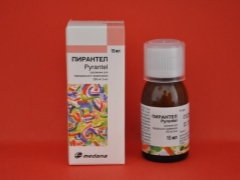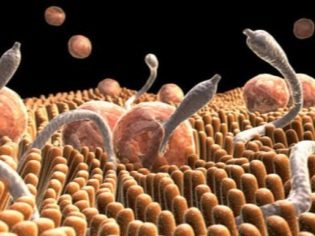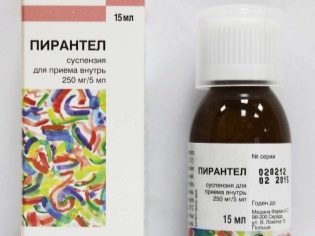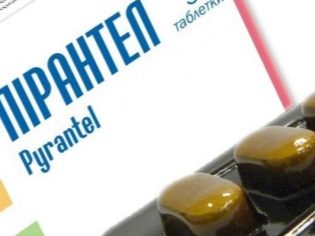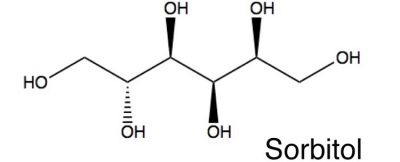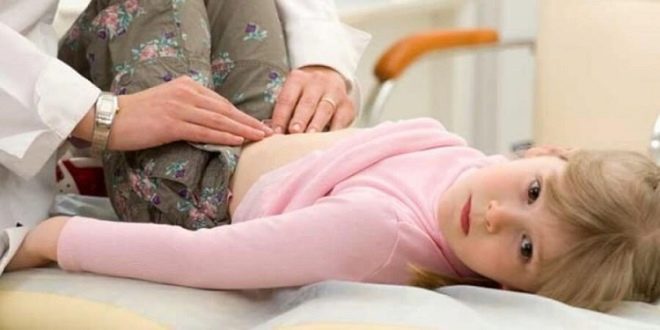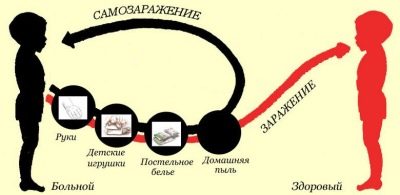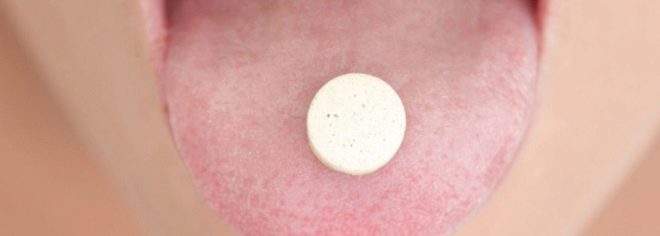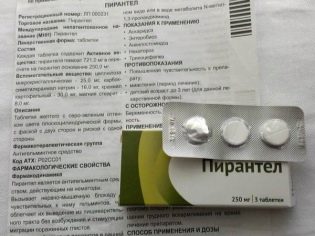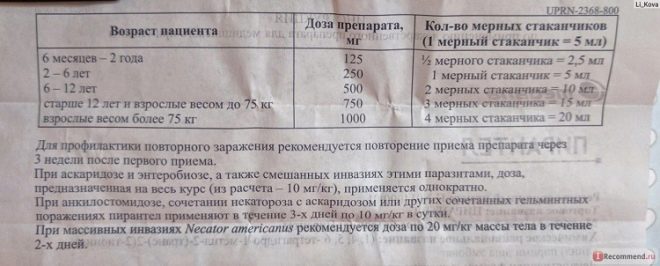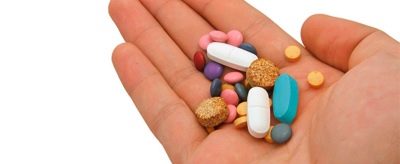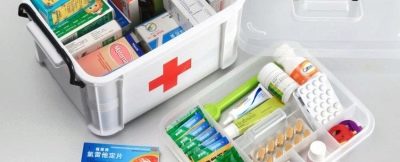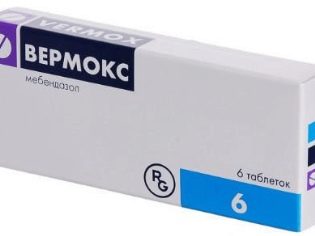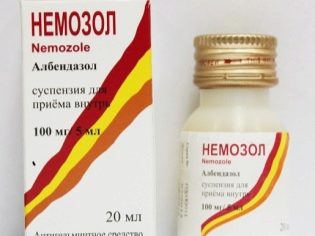Pyrantel for children: instructions for use
Worms are a common problem in childhood. Children become infected with worms through dirty vegetables, unwashed hands, licking objects lifted from the ground and other factors. The disease can be suspected by a change in the child's well-being and stool, complaints of nausea, headache and other ailments.
To confirm the presence in the body of the baby parasites help stool tests, which are advised to take not one, but several times. After the detection of helminths, the doctor must always prescribe to the child one of the drugs that act on them and eliminate the small patient from the parasites. These drugs include Pirantel. On which worms does this medication work, in what dosages is it prescribed for children and how to give such medicine correctly?
Release form
Pyrantel produces several pharmaceutical companies, among which there are both Russian and foreign (Poland, India). The drug is:
- In liquid form. Such a drug is characteristic smelling homogeneous liquid, which has a light yellow tint. During storage, the suspension can separate into water and sediment, but after stirring it becomes homogeneous again. One bottle can hold from 5 to 25 ml of medication, but 15 ml bottles are most common. In the box you can see a measuring cup or spoon. Such a measure holds 5 ml and has a mark of 2.5 ml, so the medication is easy to dose for a child of any age.
- In solid form. This Pyrantel is represented by yellow tablets, which are both round and oval. One pack contains from 3 to 30 tablets, but most often in the pharmacy you can find packs of 3 pieces each.
There are no forms of medicine like syrup, capsules, drops, or injections.
Composition
The effect of any form of Pyrantel provides a substance with the same name - this is Pyrantel pamoat. Its amount in 5 milliliters of suspension is 250 mg. The same active ingredient is in one tablet.
Auxiliary components of liquid Pyrantel are sorbitol, sucrose, water, flavoring, glycerin and other compounds.
In tablets, the main ingredient is added with talc, starch, magnesium stearate and other substances. Different manufacturers have different components, and if the child has a tendency to allergies, It is important to clarify the composition of the purchased medicine before giving it to the child.
Operating principle
The range of effects of Pirantel is called broad, since such a substance effectively affects various types of worms, including pinworms, hookworms, roundworms and other helminths.
Once in the baby’s gut, the drug is almost not absorbed, and affects mainly the worms. Under its action, a neuromuscular blockade occurs in their body, and paralyzed parasites leave the children's body with feces during a bowel movement within a few days after ingestion.
Spasms and intestinal obstruction in the treatment of such a tool does not occur, since Pirantel does not affect the function of the intestine.The drug absorbed in a small amount enters the liver and is partially metabolized there, therefore, diseases of such an organ can affect therapy.
Although the drug is unable to destroy the migrating worms of the worms, it copes well with mature forms and parasites that have already begun to develop.
Indications
The use of Pyrantel is justified:
- When enterobioze. Such a disease, which cause pinworms, diagnosed in childhood is very common. It is usually manifested by intestinal disorders and severe itching in the anus.
- When ascariasis. This is also a very common worm infestation, which provoke roundworm. Symptoms of the disease are nausea, cough, fever, lethargy, loss of appetite and other ailments.
- When ankilostomidoze. The cause of this infection is ankylostoma duodenal ulcer. Pathology is characterized by abdominal distention, nausea, skin lesions, changes in stool, fever and other symptoms.
- With necariasis. This helminthiasis is caused by ankylostomas of the New World, provoking an allergic reaction, dyspepsia and anemia in a child.
Can it be used for prophylaxis?
Pyrantel is discharged not only in the detection of worms after tests, but also as a prophylactic agent. Doctors often prescribe such medicine to a child who lives in the same house with a sick person (if the worms are found in someone from close relatives).
But many mothers often want to give the drug preventively and in such cases:
- if the child constantly communicates with pets and street animals;
- if the baby regularly visits the children's team;
- if the child often plays in the sandbox and on the street;
- if the baby is in the country, in the forest or other conditions of the wild environment.
However, most doctors do not recommend giving Pirantel to such children for prophylaxis. If the mother has suspected helminth infection, it is best to pass tests and confirm the presence of the infection, and then treat the baby with one of the anthelmintic drugs.
In other cases, according to parasitologists, To prevent helminthiasis, general preventive measures are sufficient:
- wash hands after walking and using the toilet;
- wash fruits and vegetables;
- heat treat fish and other raw foods;
- make sure that the child does not put in the mouth contaminated toys, sand and other objects;
- be regularly examined by a doctor and have a stool test (at least once a year).
From what age is appointed?
According to the annotations to Pirantel, the suspension in a liquid form is not advised to be given to children under 6 months. Babies up to six months, the drug is not contraindicated, but it is discharged in rare cases and given only under the supervision of a specialist.
Babies from 6 months to 6 years old should also be given medication with increased caution.
Pyrantel tablets prescribed from 3 years, if the child does not protest against the solid form. In practice, in most cases, children 3-6 years old are given a suspension, since it is easier to swallow it, and the side effects of such an agent are less frequent.
Children older than six years, as well as adults, are equally often given as a tablet form and suspension.
Drug advantages
Pyrantel is chosen as antihelminthic medication for such reasons:
- this drug is effective against many types of worms, among which there are the most common pathogens of helminthiasis in children (such as roundworms and pinworms are such worms);
- the drug is classified as low-toxic, because it is absorbed in the gastrointestinal tract in the minimum amount and does not affect the functioning of the internal organs of the child;
- due to the presence of two forms of the drug can be given at any age, choosing a remedy for both infants and preschoolers or adolescents;
- the drug affects only the parasites and is excreted from the body within 24 hours;
- since Pirantel does not kill roundworms, but only paralyzes them, intoxication does not arise from the decomposition of dead parasites;
- the drug has an affordable price, and since it is produced by several companies, it is almost always available in pharmacies.
Contraindications
Pyrantel should not be used in children who have an intolerance to any of the ingredients of the selected form of medication. In addition, all types of the drug are contraindicated in children with myasthenia during the treatment of this disease.
Pyrantel is not recommended for patients with liver failure, because the normal operation of the liver is important for the timely change of the active substance and its removal from the human body.
Side effects
The drug is often well tolerated, but in some cases it can worsen the child’s condition:
- in the treatment of Pirantel, a negative reaction of the gastrointestinal tract occurs in the form of a stool liquefaction, loss of appetite, abdominal pain, vomiting and other symptoms;
- Occasionally, the use of a medication causes skin rash, fever, hives, or other allergic reaction;
- in some children, medication has a negative effect on the central nervous system, causing paresthesias, weakness, headache, hallucinations, and other symptoms.
If any of these side effects occur after Pirantel is applied, the child should be shown to the doctor and not to use such an anthelmintic agent in the future, replacing it with analogues that will cope with the helminthic invasion no less effectively.
Which form to choose?
If a child is not yet three years old, then it is permissible for him to give an exceptionally liquid version of Pirantel, while for three-year-olds and older children, it is possible to use both the suspension and the tableted medicine.
Each form has both advantages and disadvantages. For example, it is easier for a child to swallow a suspension than to chew a large enough pill well.
However, some children categorically protest against any syrups and suspensions, preferring solid medicine. It is more convenient for such patients to give Pirantel tablets. The tablets cost a little cheaper than the suspension, so for patients who are equally related to both forms, they also often buy Pirantel in tablets.
We also note that for young children of 3-6 years old, liquid medicine is more often chosen, including because it has a less aggressive effect on the gastric mucosa.
Instructions for use
The drug is used in children, taking into account such nuances:
- The tool in most cases prescribed once, that is, the suspension or tablets in the right dose taken at a time. Only with some pathologies, Pirantel is drunk for several days, but such a treatment should be prescribed by a doctor.
- Suspension before taking necessarily need to shake, so that its components are well mixed. If the medication is given for 2 or 3 days, then agitation is required before each use.
- The tablet should be chewed, then drink a glass of water.
- The drug can be given to the child at night or at any other time. Reception should be either with meals or after meals. The combination of Pyrantel with laxatives is not required.
- If pinworms are found in a small patient, it is recommended to give the drug not only to the child, but also to family members living with it.
- In order to prevent re-infection, three weeks after taking Pirantel for the first time, the medicine can be given again at the same dose.
- To ensure the effectiveness of the drug, it was recommended to conduct stool tests 2 weeks after applying the suspension or tablets.
The dosage in childhood is determined by weight, as well as depending on the diagnosis. If a child has ascariasis or pinworms, then he is given 10 mg per 1 kg once. If ankylostomid is found in a small patient, the dose may be increased to 20 mg / kg, and the drug must be given the second day in a row, and sometimes within three days.
Most often, when prescribing a suspension, the medicine is used in the following dosages:
- for a child of 6 months - 2 years old weighing less than 12 kg - 2.5 ml (half of the measure);
- for a child of 2-6 years old weighing more than 12 kg - 5 ml (one measure);
- for a child of 6-12 years old - 10 ml (2 measurements at once);
- for a child over 12 years old - 15 ml (3 measurements at once).
When treating tablets, Pirantel is used in such doses:
- A child of 3-6 years old is given one pill;
- A child aged 6 to 12 years old gives two tablets at the same time;
- A teenager over the age of 12 is given three pills at once.
Overdose
Until that time, there had been no cases when a high dose of Pyrantel had a toxic effect. If a child accidentally takes this medication in an unnecessarily large dosage, He is advised to induce vomiting, and for any symptoms of indisposition, it is worthwhile to show the baby to a specialist.
Interaction with other drugs
The simultaneous use of Pirantel and other anthelmintic drugs without a doctor's prescription is not recommended, as this may increase the load on the liver or weaken the effect of medicines. In addition, you should not combine Pirantel and theophylline preparations, so as not to cause side effects.
Terms of sale
Any form of Pirantel is sold only by prescription, so before going to the pharmacy, you should visit a pediatrician, a gastroenterologist, or some other specialist.
The cost of the drug affects the form of release, and the manufacturer, and packaging. On average, for 15 milliliters of suspension, you need to pay 30-60 rubles, and a package of 3 tablets costs 20-40 rubles.
Storage conditions
The shelf life of both forms of Pirantel is 3 years. Until it expires, it is necessary to keep the medicine at home at a temperature below 25 degrees Celsius out of the reach of children. The medicine during storage should not be affected by the direct rays of the sun.
Reviews
About the use of Pyrantel in children with helminthiasis there are many good reviews. In them, the drug is called affordable and effective. Mothers often choose a suspension, because this liquid form can be given even to infants, and it is easy to dose it. Tablets are more often preferred for the treatment of children older than 6 years.
The disadvantages of drugs include side effects. Although rare, the medicine can cause diarrhea, nausea, fever, weakness and other negative symptoms. In addition, many children do not like the taste of Pirantel, and the pills are large in size and difficult to chew on them (especially if you need to take several pieces at once).
Analogs
The same active ingredient as Pirantel, is in the French medicine called Helmintox. This medication is also represented in two forms, is prescribed for the same helminth infections and is used from 6 months of age (as a suspension).
Its differences are only a different composition of auxiliary components, as well as a higher cost.
Instead of Pyrantel in the treatment of worms can be used and drugs with a different composition, for example:
- Vermox or Vormin. Such medicines in tablets contain mebendazole and help with teniasis, ascariasis and other helminth infections, including mixed ones.
- Nemozol or Sanoxal. These preparations based on albendazole in tablets and suspensions are used not only for various helminthic invasions, but also for giardiasis.
- Dekaris. The basis of this drug is levamisole, effective against ascaris and hookworm.
- Piperazine. This medicine is in demand for enterobiasis and ascariasis.
The choice of any of these analogues should be made by a doctor, because they have different age limits and have their own characteristics of use. Giving any of these drugs without a doctor's prescription is not recommended.
